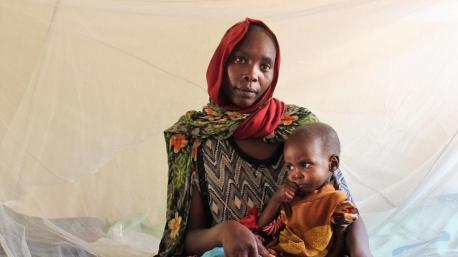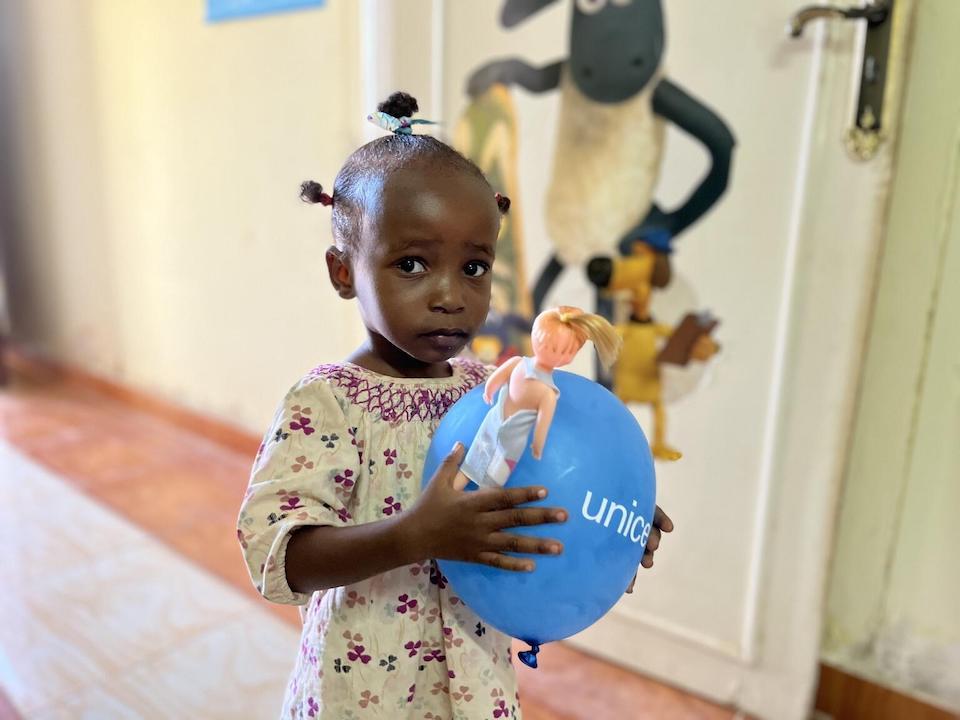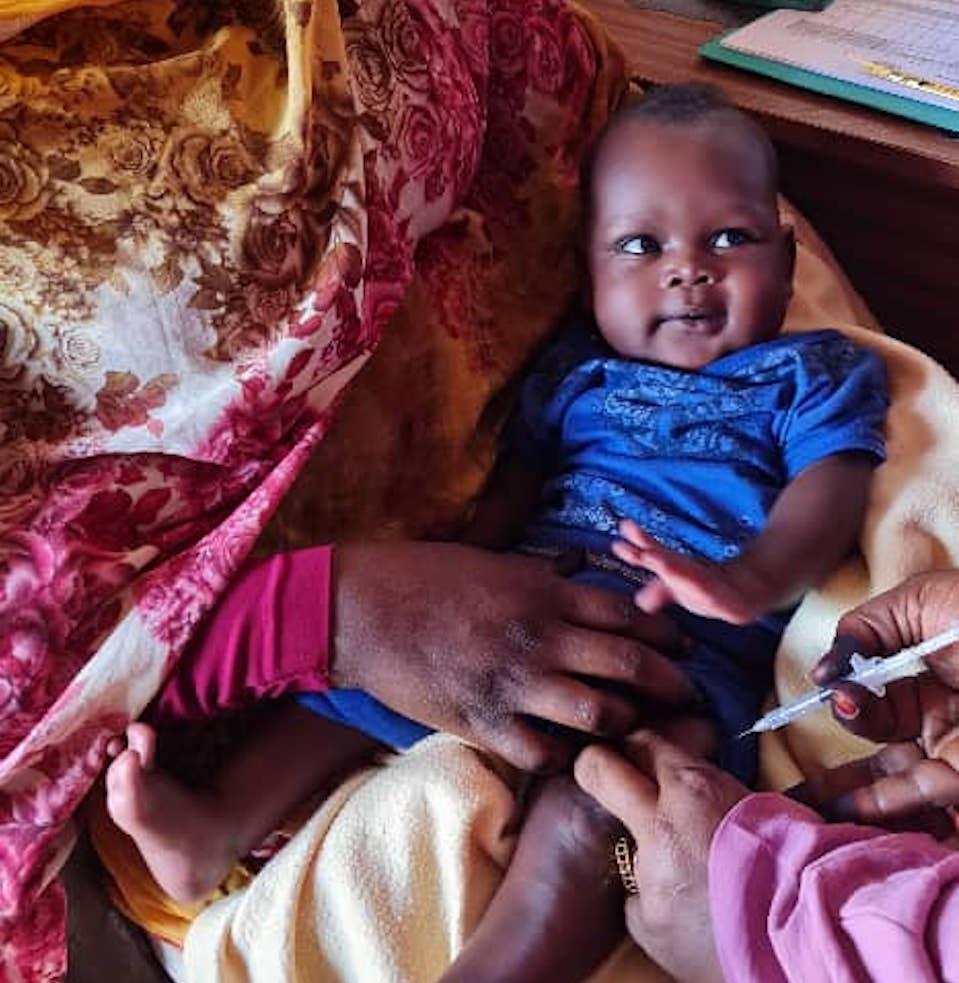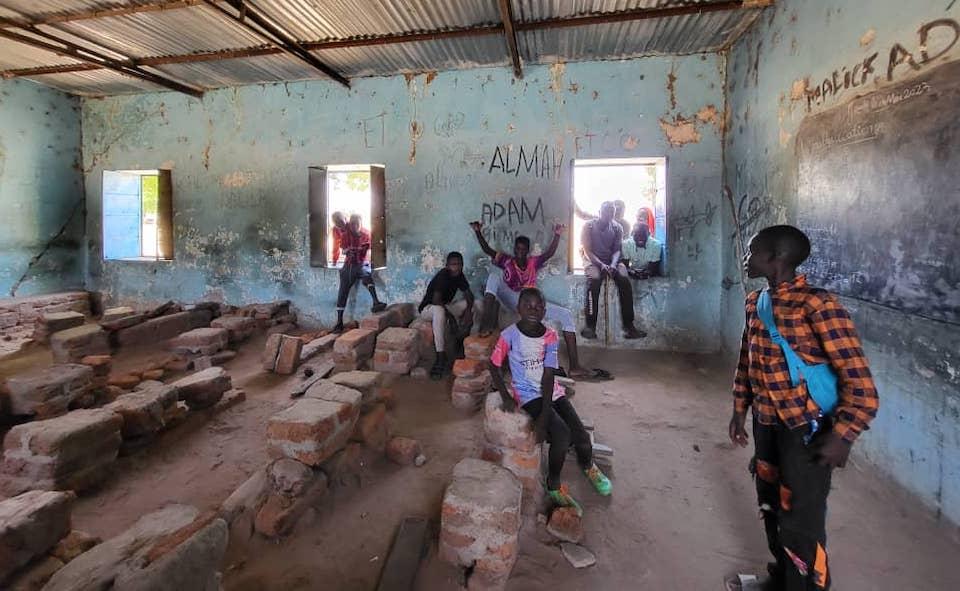
UNICEF in Sudan
UNICEF remains committed to reaching children and families impacted by conflict and other crises in Sudan with lifesaving support and protection — working with partners to keep critical health, nutrition and other services going, even as armed conflict rages on. Learn more and how to help.
A crisis on top of a crisis for children in Sudan
Sudan, already one of the most dangerous places in the world to be a child, has become even more perilous amidst full-scale armed conflict between warring groups.
Food, water and other essential supplies are severely constrained, access to essential services sharply curtailed across most of the country. Prices for staples have soared. Schools and health facilities are closed or poorly functioning.
Heavy fighting broke out in Khartoum on April 15, 2023, quickly spreading into other cities in regions. Within months, over 6 million people had been displaced by the violence, half of them children, making it the largest child displacement crisis in the world.
In June 2024, UNICEF and other United Nations agencies warned that the country was facing a devastating hunger catastrophe on a scale not seen since the Darfur crisis in the early 2000s.
UNICEF remains on the ground inside Sudan working with local partners — including dozens of national and local NGOs — to deliver emergency supplies to meet urgent needs and to find ways to continue critical programs in health, nutrition, water and sanitation, education and child protection.
UNICEF is also working in neighboring countries to assist refugees fleeing conflict and to support host communities that are themselves in need of humanitarian aid.
How UNICEF is helping Sudanese children
UNICEF, with a presence in Sudan since the 1950s, has been focused on improving critical services and providing support and protection to the most vulnerable children and families.
Priorities include:
- Health: supporting primary health care centers and hospitals, providing supplies including medicines, protecting and strengthening the cold chain to preserve essential medicines including vaccines; providing mental health and psychosocial support to traumatized children
- Water, sanitation and hygiene (WASH): providing safe drinking water and strengthening or restoring critical WASH services
- Nutrition: screening and treating children for malnutrition
- Child protection: monitoring and reporting violence against children and other grave violations of child rights; identifying unaccompanied and separated children and reuniting them with their families; preventing and responding to gender-based violence
- Education: improving access to formal or informal schooling to address learning poverty
Country programs in Sudan have long been underfunded. Urgent support is needed to enable UNICEF to keep delivering for children and families as their needs continue to multiply.
Learn more: read UNICEF's latest appeal for Sudan.

© UNICEF/UN0836691/Younis
Poverty, hunger in Sudan
Millions of families in Sudan have been experiencing great hardship for some time now. COVID-19 made things worse for many of them, and the socio-economic effects of the pandemic are still keenly felt in the country. Poverty and hunger are widespread.
In Sudan, there are natural hazards to contend with, such as drought and flooding, conditions that have become more frequent and more intense due to climate change. These climate shocks have uprooted millions of people from their homes, jobs and lives, sometimes many times over.
Child malnutrition is a major concern in Sudan. UNICEF is the lead supplier of the Ready-to-Use Therapeutic Food (RUTF) used to treat child wasting, a leading cause of death among Sudanese children under 5.
UNICEF's health teams in Sudan work with partners to bolster the country's fragile health system, and to increase immunization rates among children to prevent outbreaks of vaccine-preventable disease.

Child protection teams focus on helping children stay safe. UNICEF also monitors child rights violations, including the rising number of children being forcibly recruited by armed groups, which not only puts them in physical danger but also causes mental distress. Many of these children become victims of gender-based violence.
Education needs in Sudan
Education support for children in Sudan is another top priority. An estimated 7 million children are out of school, and that was before armed conflict shuttered all educational institutions across the country in spring 2023.
UNICEF works to keep kids learning in schools or alternative spaces, through digital means or in Child-Friendly Spaces UNICEF sets up in refugee camps and other sites where displaced families are sheltering. Child-Friendly Spaces also connect children with other services including mental health and psychosocial support.

Flexible funding needed to provide relief for Sudan
In early May 2023, as conflict raged inside the country, the factory and warehouses run by Sudan's only domestic manufacturer of RUTF were burned down — destroying 14,500 cartons that had been bound for treatment centers where children suffering from the most dangerous form of malnutrition were waiting.
UNICEF Spokesperson James Elder called it "yet another bitter blow," the "darkest, most distinct illustration to date of how the conflict threatened the lives of children through multiple means."
And yet: UNICEF and partners continue to reach children with the nutrition support they so desperately need, finding ways to keep supplies coming.
"Somewhat miraculously – certainly heroically – 80 percent of [UNICEF-supported] outpatient therapeutic programs are currently operational in Sudan," Elder noted. "This is testament to UNICEF’s partners, and the health workers of Sudan."
UNICEF has been operating in Sudan for over 70 years and remains committed to delivering for children, especially the most vulnerable. Shortly after conflict erupted in mid-April 2023, an operational team temporarily relocated to UNICEF’s Port Sudan sub-office, and continues to stage country-wide operations from there.
In a volatile situation like this, emergency response teams must be able to stay agile. Flexible funding support is the best way to ensure that UNICEF can continue delivering lifesaving protection and support to children and families suffering the impacts of conflict and related crises in Sudan.
Donate today. Your tax-deductible contribution can make a difference.





